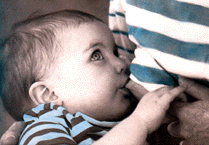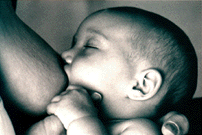Breast Feeding

|
There is no healthier
alternative than giving your baby the very milk that your body produces! This is scientific fact. Formula is imitation (artificial) baby milk. While formula is preferable to cow's milk, and healthier than cow's milk, it in no way measures up to fresh breast milk. It lacks about 80-100 components found in pure breast milk. Studies have shown that breast fed babies have 1/3 the illness that artificially fed babies have. Yes, if you are giving your baby formula, you are giving your baby artificial "food". Over the past 20-25 years research has documented the health hazards of not breast feeding your infant. There are subtle but sure differences in infants fed artificially. There were several studies that showed formula fed infants scored up to 10 points lower on I.Q. testing at various ages. Allergic manifestations occur at greater rates among artificially fed infants that include simple food allergies to colitis and severe diaper rashes, eczema, and psoriasis. Anaphylactic (allergic) shock has been reported in some highly sensitive babies. In the United States approximately 5000 infants die due to formula feeding per year! (That is 5000 needless deaths, had their mother's breast fed). World wide that number is much higher. In the United States we are blessed with a health care system that can "fix" the diarrhea and other manifestations of illness that occur while an infant is being formula fed. Other nations are not so lucky. There is a 4-16 fold higher risk of an infant getting H. influenza bacteremia and meningitis. Because of this iatrogenic (formula related illness) we now have a mandatory immunization against this killer. Formula fed infants have a 10 fold risk of being hospitalized for any bacterial born illness than breast fed infants. Otitis media is 3-4 times more prevalent in artificially fed infants. Formula feeding accelerates the development of celiac disease. It also increases a the risk for the development of Crohn's disease. In premature infants, those infants given formula developed Necrotizing Enterocolitis (NEC) twenty times that of breast fed (or breast milk) fed premies. Studies in the eighties showed that breast feeding was easier on a premature infant's breathing patterns than bottle feeding.
 In addition, there have been times when contaminants were found in infant formulas such as excesses of lead, aluminum, vitamin D and iodine. Furthermore, formula is missing some of the life enhancing properties of breast milk such as DHA and other essential fatty acids. It is higher in protein content than breast milk making the kidneys work harder to clean the waste products out of the system. In addition, life threatening bacteria can thrive in both the liquid based and powered formula's leading to severe illness and death in some infants! Infants fed by a bottle are at increased risk of cardiopulmonary disturbances. Preterm infants have shown decreased oxygen saturation and cessation of breathing while bottle feeding. This is due to the frequent swallowing and limited breathing time. Even full term infants can have decreased oxygenation and a heart rate much below normal while bottle feeding. The cost of formula feeding your infant is around $1000 to $1500 per year. WIC spends $500 million per year in it's supplemental food program. Infant formula costs more than just dollars. It has environmental costs to our future generations of human kind. It costs the grain fed to the cows, the cost of dehydrating and reformulating cow's milk. The cost of trees or natural wetlands to create packaging and bottles of plastic and cardboard that eventually fill the land fills! Breast feeding costs mother a few extra calories a day, perhaps in the form of an extra piece of bread, an egg and an orange.
 |